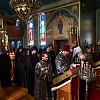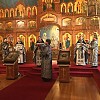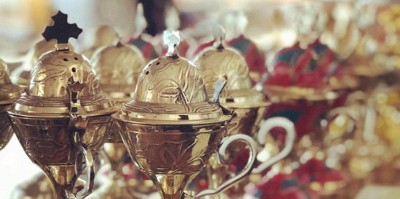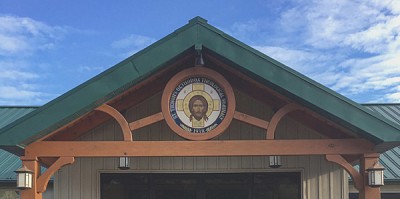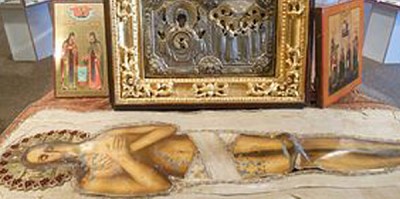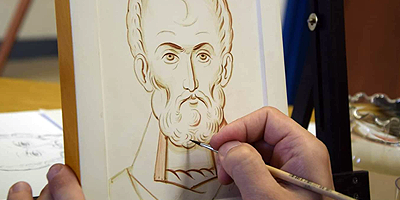Father Alexander+ examines the weekdays of the Lenten season
(2) Weekdays of Lent – The Daily Cycle
Lent consists of six weeks or forty days. It begins on Monday after the Cheese Fare Sunday and ends on Friday evening before Psalm Sunday. The Saturday of Lazarus’ resurrection, the Palm Sunday and the Holy Week form a special liturgical cycle not analyzed in this article. The Lenten weekdays – Monday through Friday – have a liturgical structure very different from that of Saturdays and Sundays. We will deal with these two days in a special paragraph.
The Lenten weekday cycle, although it consists of the same services, as prescribed for the whole year (Vespers, Compline, Midnight, Matins, Hours) has nevertheless some important particularities:
(a) It has its own liturgical book – the Triodion. Throughout the year the changing elements of the daily services – troparia, stichira, canons – are taken from the Octoechos (the book of the week) and the Menaion (the book of the month, giving the office of the Saint of the day). The basic rule of Lent is that the Octoechos is not used on weekdays but replaced by the Triodion, which supplies each day with,
— at Vespers – a set of stichiras (3 for "Lord, I have cried" and 3 for the "Aposticha") and 2 readings or "parimias" from the Old Testament.
— at Matins – 2 groups of "cathismata" ("Sedalny," short hymns sung after the reading of the Psalter), a canon of three odes (or "Triodion" which gave its name to the whole book) and 3 stichiras at the "Praises," i.e., sung at the end of the regular morning psalms 148, 149, 150 – at the Sixth Hour – a "parimia" from the Book of Isaiah.
The commemoration of the Saint of the day ("Menaion") is not omitted, but combined with the texts of the Triodion. The latter are mainly, if not exclusively penitential in their content. Especially deep and beautiful are the "idiornela" ("Samoglasni") stichira of each day (1 at Vespers and 1 at Matins). And it is a sad fact that so little of the Triodion has been translated into English.
(b) The use of Psalter is doubled. Normally the Psalter, divided in 20 cathismata is read once every week: (1 cathisma. at Vespers, 2 at Matins). During Lent it is read twice (1 at Vespers, 3 at Matins, 1 at the Hours 3, 6 and 9). This is done of course mainly in monasteries, yet to know that the Church considers the psalms to be an essential "spiritual food" for the Lenten season is important.
(c) The Lenten rubrics put an emphasis on prostrations. They are prescribed at the end of each service with the Lenten prayer of St. Ephrem the Syrian, "O Lord and Master of my life," and also after each of the special Lenten troparia at Vespers. They express the spirit of repentance as "breaking down" our pride and selfsatisfaction. They also make our body partake of the effort of prayer.
(d) The Spirit of Lent is also expressed in the liturgical music. Special Lenten "tones" or melodies are used for the responses at litanies and the "Alleluias" which replace at Matins the solemn singing of the "God is the Lord and has revealed Himself unto us."
(e) A characteristic feature of Lenten services is the use of the Old Testament, normally absent from the daily cycle. Three books are read daily throughout Lent: Genesis with Parables at Vespers. Isaiah at the Sixth Hour. Genesis tells us the story of Creation, Fall and the beginnings of the history of salvation. Parables is the book of Wisdom, which leads us to God and to His precepts. Isaiah is the prophet of redemption, salvation and the Messianic Kingdom.
(f) The liturgical vestments to be used on weekdays of Lent are dark, theoretically purple.
The order for the weekday Lenten services is to be found in the Triodion ("Monday of the first week of Lent"). Of special importance are the regulations concerning the singing of the Canon. Lent is the only season of the liturgical year that has preserved the use of the nine biblical odes, which formed the original framework of the Canon.
(3) Non-Liturgical Days
The Liturgy of the Presanctified Gifts
On weekdays of Lent (Monday through Friday) the celebration of the Divine Liturgy is strictly forbidden. They are non-liturgical days, with one possible exception – the Feast of Annunciation (then the Liturgy of St. Chrysostom is prescribed after Vespers). The reason for this rule is that the Eucharist is by its very nature a festal celebration, the joyful commemoration of Christ’s Resurrection and presence among His disciples. (For further elaboration of this point cf. my note "Eucharist and Communion" in St. Vladimir’s Quarterly, Vol. 1, No. 2, April 1957, pp. 31-33.) But twice a week, on Wednesdays and Fridays, the Church prescribes the celebration after Vespers, i.e., in the evening of the Liturgy of the Presanctified Gifts (cf. the order of this service in I. Hapgood, The Service Book, pp. 127-146.) It consists of solemn Great Vespers and communion with the Holy Gifts consecrated on the previous Sunday. These days being days of strict fasting (theoretically: complete abstinence) are "crowned" with the partaking of the Bread of Life, the ultimate fulfillment of all our efforts.
One must acknowledge the tragical neglect of these rules in many American parishes. The celebration of the so called "requiem liturgies" on non-liturgical days constitutes a flagrant violation of the universal tradition of Orthodoxy and cannot be justified from either theological or pastoral points of view. They are remnants of "uniatism" in our Church and are in contradiction with both – the Orthodox doctrine of the commemoration of the dead and the Orthodox doctrine of Eucharist and its function in the Church. Everything must be done in order to restore the real liturgical principles of Lent.
|
| |||||||||||||
175 St. Tikhon's Road
Waymart, PA 18472
Sat
27Apr7:40 Hours & Divine Liturgy
4:00 VigilSun
28AprPALM SUNDAY
9:10 Hours and Divine Liturgy
3:30 Vespers
4:30 Bridegroom MatinsMon
29Apr8:00 Hours and Presanctified Liturgy
4:30 Bridegroom Matins


